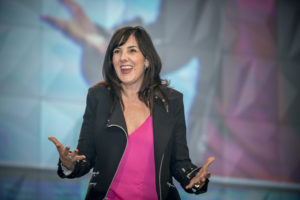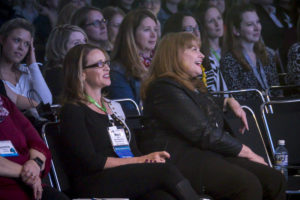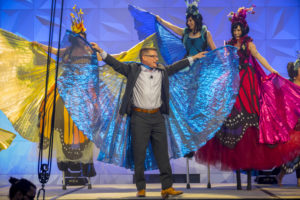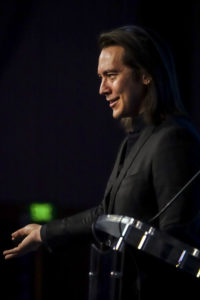By Beth Buehler
Most anyone who attends conferences can recall great keynote speakers they’ve heard or people who simply hit home in some way with their message, whether it is the authenticity of their stories, valuable industry knowledge or good humor with a purpose. Keynote speakers can help set the tone for a meeting, plug attendees into goals for the meeting, break up a day full of breakout sessions, and unite the group with discussion the message creates or some kind of quick interactive activity.
The two Colorado-based conferences that I attend every year are the Meetings Industry Council (MIC) of Colorado Educational Conference and Trade Show and the Colorado Governor’s Tourism Conference, which rely on great keynote speakers to keep 1,200 and 500 attendees engaged in the day and coming back from year to year. Plus, all sorts of associations that I write about in the meetings and events industry and attend for my own interests seek keynotes for membership meetings, including Destination Colorado!
Debbie Taylor and Dean Savoca have been key players in putting together the speaker lineup for many MIC conferences (always held mid-March in Denver at the Colorado Convention Center), and I’m always impressed with the quality of keynotes. In fact, books by two keynotes from recent years have found places in my personal library. So I asked Debbie, founder/owner of Taylor Made Events & Speakers, and Dean, principal/owner of Savoca Performance Group and current chair of MIC of Colorado, for tips in finding outstanding keynote speakers and added a few of my own. Dean also is a speaker, so his insider insights are helpful.

Humorist Christine Cashen was a keynote speaker and the emcee for the 2017 MIC conference.
Debbie Taylor, Taylor Made Events & Speakers, Denver
Asking questions is crucial in choosing the perfect speaker and assuring alignment with attendees’ and client’s goals.
- Why does the client want a professional speaker? In other words, what do you want the keynote to accomplish?
- What are the overall objectives for the meeting and in what way do you expect the speaker to reinforce these objectives?
- Who is the audience and what challenges are they facing?
- How will a speaker motivate the audience to take action?
- How will you measure the results of the speaker three months after the meeting?

A great speaker engages the audience, including Debbie Taylor in the front row to the right during the MIC conference.
In terms of how far out to book, I just booked Patrick Kennedy for April 2020 but it is possible to book a month out. Six months to one year out will normally secure a speaker, with spring and fall being very busy times for speakers.
I am normally in communication with a speaker’s office. Many times, I prefer to speak to them by phone at the beginning to build rapport if I don’t already know them. Then, we email until a conference call is scheduled about three weeks out from the date with the speaker and client so all questions are answered.
Dean Savoca, M.Ed., BCC, CSP, Savoca Performance Group, Denver
Key things to consider including the following three items.
- Determine the overall strategic objectives of the conference.
- Identify the audience challenges/problems and the experience/outcomes that are desired in the general session.
- Find the keynote speaker who has the expertise and skill set to deliver on the objectives and outcomes and help solve a problem for the audience (and fits the budget).

MIC Chair Dean Savoca not only interacted with the crowd but doubled as a performer to welcome attendees.
Most planners start working on the following year’s conference a month or two after the current year’s conference. There is a wide range of booking windows. If a meeting planner wants a specific speaker, they may need to book further out (year+) but shorter bookings happen often; it’s just a matter of speaker availability.
Speakers want to be seen as a partner to help the meeting planner achieve their conference objectives and appreciate transparency on what they need and what they want to accomplish so the speaker can determine if they are the right fit or not. Speakers want what meeting planners want, for the program to be a great success. Also, many speakers have a team member to help work out the logistics, but most speakers want to talk directly to the meeting planner and also audience members to gain perspectives and help customize the presentation.
For finding the best keynoter speakers, I would be remise not to mention the National Speakers Association and the Certified Speaking Professional (CSP) designation, which is the highest earned honor for a professional speaker (less than 12 percent of speakers who belong to the 14 member associations of the Global Speakers Federation hold this designation). Speaker bureaus also can be great resources for “hot” speakers on certain topics and have seen many professional speakers in action.
Observations from an attendee and meetings and events editor/writer
Now a few from me!
Look at the resources available. By this, I mean consider the amount of budget dollars available for hiring a keynote speaker(s) and research what quality speakers are located near where the meeting is being held. For example, Colorado has an abundance of great keynotes in the form of experts from a wide range of fields, authors, celebrities, athletes and more. This can help save money by trimming down travel costs and incorporate a touch of local at the same time.
Ask and look around. Many times your own network of people, other meeting and event planners, and destination marketing organizations will have great ideas. Also ask attendees if they have run across someone great at other meetings or have someone they would love to hear speak at a conference and why. Destination management companies and speakers bureaus also are terrific resources, and the National Speakers Association/Colorado has a “find a speaker” section on its website.
Consider specific details about keynote candidates. Research past speaking engagements, watch presentations and talk to past clients. What value will the speaker bring to the meeting and are they inspirational, entertaining, informative or a good teacher about a specific topic? Is the speaker helpful, flexible and willing to interact with attendees in a meaningful way that goes beyond the stage?

The second day of the 2017 MIC conference opened with a look at technology and the 21st century by futurist Mike Walsh.
The two main keynotes for the 2017 Colorado Governor’s Tourism Conference last fall were Roger Dow, president and CEO of the U.S. Travel Association, and Rick Steves, guidebook author and travel TV host. I remembered both (without looking back at the schedule!) because Dow was informative about the travel industry and Steves entertained with his travel stories; plus, both were quality speakers that plugged into the purpose of the conference and interacted with attendees, one even at the post awards dinner dance party. They also weaved Colorado into their presentations.
With these tips in mind, go out and locate the very best speakers possible for your upcoming meetings!
Photos courtesy of the Meetings Industry Council of Colorado and All Digital Photo & Video.
Beth Buehler is editor of Colorado Meetings + Events and Mountain Meetings magazines, has planned numerous meetings and events, and enjoys exploring Colorado.
